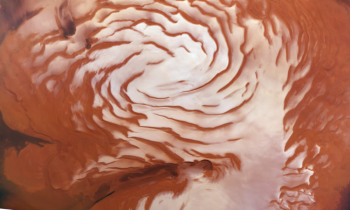Mars is coming out of an extreme ice age, study finds
June 8, 2016

In a discovery that could shed new light on the past habitability of Mars and provide new insight into how to deal with the climate change problem back here on Earth, a team of researchers found evidence of an ice age recorded in the polar deposits of the Red Planet.
Writing in Friday’s edition of the journal Science, Dr. Isaac Smith, a postdoctoral researcher at the Southwest Research Institute (SwRI) in San Antonio, and his colleagues explained they analyzed radar data collected using the NASA Mars Reconnaissance Orbiter and found layered ice deposits around the planet’s north pole similar to those responsible for ice ages on Earth.
“Because the climate on Mars fluctuates with larger swings in axial tilt, and ice will distribute differently for each swing, Mars would look substantially different in the past than it does now,” explained Dr. Smith, who worked on the study alongside scientists from the University of Texas Institute for Geophysics and the McDonnell Center for the Space Sciences at Washington University in St. Louis. “Furthermore, because Mars has no oceans at present, it represents a simplified ‘laboratory’ for understanding climate science on Earth.”
Red Orbit, May 27, 2016
